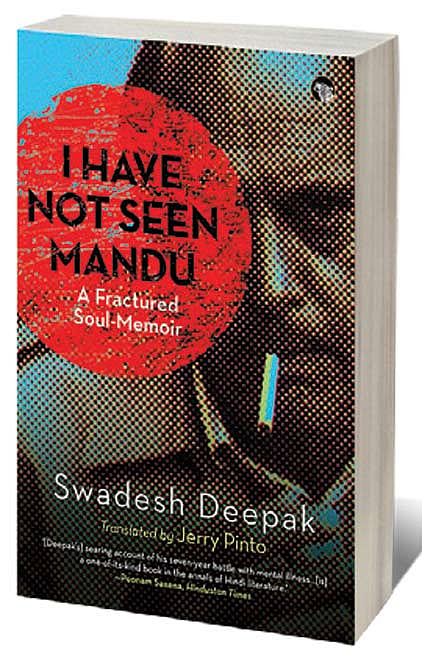An Imprisoned Mind

HINDI PLAYWRIGHT, novelist and short story writer Swadesh Deepak blazed a trail when he was active on the literary scene. His best-known works includes the plays Court Martial and Kaal Kothri. Deepak’s memoir, Maine Mandu Nahin Dekha was published in 2003. The English translation, I Have Not Seen Mandu (translated by Jerry Pinto) appeared in print recently. Deepak suffered from a mental illness for seven years and his memoir, which recounts his experiences in stark detail, was written during a brief period of recovery. Three years after the publication of his memoir, Deepak left his home in Ambala for a walk and never returned. His whereabouts remain unknown.
I Have Not Seen Mandu is a fractured account of a fractured mind. Deepak does not try and stitch together a neatly ordered memoir. The form matches the content: there is no way to contain the chaos of his seven-year-long experience within a set framework. He begins (in a manner of speaking) with the first-hand account of his journey with a woman called Mayavini inviting him to go to a place called Mandu with her. Flashes of memory illuminate the pages, and time lurches forward and backward in this “soul memoir”. In his brief note at the start of the book, Deepak says, “since memory comes in flashes, I used the collage mode, juxtaposing various time zones…the dark shadow of this disease never evaporates.”
AIming High
20 Feb 2026 - Vol 04 | Issue 59
India joins the Artificial Intelligence revolution with gusto
In order to piece together his experience of seven years, Deepak sifts through the fragments lodged in his memory. He also recounts conversations with friends and family—his wife Geeta and their two children, who take on the role of caregivers with all its attendant burdens. The translator has aptly dedicated I Have Not Seen Mandu to “all those who have suffered from mental distress and all those who have loved them.”
An entire star cast of writers and artists too populate the pages of the book. They come and go, speaking of both the sublime and the ridiculous; teasing each other, giving Deepak friendly advice, commenting on the world at large and on each other’s lives and loves. Krishna Sobti, Faiz Ahmed Faiz, Nirmal Verma, Jehangir Sabavala, Ebrahim Alkazi, Gyan Chaturvedi, Nadira Babbar, and Piyush Mishra all make an appearance. So does a Hindi-speaking WB Yeats. I Have Not Seen Mandu is as much a book about madness as it is about writing, the creative impulse, and the writer’s attempts to make some sense of a maddening world by writing about it.
Some may call this memoir “difficult reading”. Some parts such as Deepak’s account of the time he spent at a Chandigarh hospital after attempting suicide and his struggle to answer doctors’ endless questions are hard to get through. Deepak describes his exhaustion in painful detail, “I was tired...I was in a country where no one spoke my language.” Sometimes, transitions between sections are abrupt and the leaps in time can leave the reader disoriented. There is no guarantee that the present will be followed by the future as expected. In fact, a section titled ‘The Present’ is followed by a second one titled ‘The Present’. Shifts in time also happen within scenes without warning or explanation. When Deepak and Mayavini—“the seductress who is constantly at my shoulder”—are having a chat seated in a car, a woman with a tea tray comes in. The setting doesn’t change. The reader is left to her/his own devices to navigate such jumps.
Puzzling, unclassifiable, and disorienting as it is, I Have Not Seen Mandu is one of the most powerful personal accounts of mental illness available in print. There are passages of lyrical beauty where words leap off the pages and grab the reader by the throat. There are unforgettable moments of pathos and poignancy culled from both Deepak’s churning internal sea as well as the experiences of the caregivers who stand by him through the worst.

